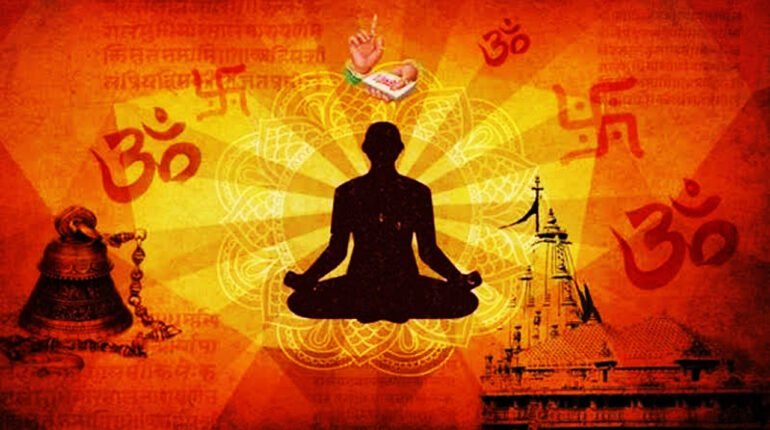
Sanatan Dharma vs. Hinduism: Understanding the Distinction Between Eternal Principles and Modern Identity
| Sanatan Dharma | Hinduism |
| Meaning: Eternal Duty or Universal Law. | Meaning: A cultural and religious identity of the Indian subcontinent. |
| Scope: Timeless principles applicable to all of humanity. | Scope: Diverse practices, rituals, and beliefs unique to a specific region. |
| Philosophy: Emphasizes non-violence, truth, compassion, and self-realization. | Philosophy: Includes worship of deities, rituals, festivals, and scriptures. |
| Nature: A way of life and spiritual practice, not tied to a specific culture or geography. | Nature: A religion with organized traditions and cultural significance. |
| Symbols: Cosmic mandala, meditation, tree of life. | Symbols: Temples, traditional motifs, deities like Ganesh and Vishnu. |
The terms Sanatan Dharma and Hinduism are often used interchangeably, but they represent distinct concepts with unique origins, meanings, and implications. To comprehend the distinction, we must delve into their philosophical roots and historical development.
The Eternal Essence of Sanatan Dharma
Sanatan Dharma translates to “Eternal Duty” or “Eternal Order.” It refers to timeless, universal principles that guide ethical living, spirituality, and the pursuit of truth. Sanatan Dharma emphasizes the following core ideas:
- Universal Values: It advocates non-violence (ahimsa), truth (satya), compassion (karuna), and righteousness (dharma) as fundamental principles applicable to all of humanity.
- Inclusivity and Timelessness: It transcends time, geography, and culture, promoting a universal way of living in harmony with nature and the cosmos.
- Spiritual Practices: Sanatan Dharma emphasizes personal spiritual growth through practices like yoga, meditation, and self-inquiry, encouraging individuals to seek truth and self-realization.
- No Single Institution or Dogma: Unlike organized religions, Sanatan Dharma lacks a centralized authority, scripture, or founder. It is a way of life rather than a structured belief system.
Hinduism: A Historical and Cultural Identity
Hinduism, on the other hand, is a term that emerged much later, primarily through historical and colonial influences. The term was popularized by Persian and Greek invaders to describe the diverse traditions, practices, and beliefs of people living beyond the Sindhu (Indus) River. Over time, it became a label for the collective identity of the Indian subcontinent’s religious and cultural practices.
- Diverse Practices: Hinduism encompasses a vast array of rituals, festivals, deities, and sects, making it a pluralistic religion.
- A Geographical Identity: Historically, it referred to the cultural and religious practices specific to the Indian subcontinent.
- Colonial Influence: During British colonial rule, Hinduism was systematized as a religion to fit Western notions of organized faiths, differentiating it from Islam and Christianity.
- Modern Interpretations: Today, Hinduism is seen as one of the world’s major religions, with specific scriptures like the Vedas, Upanishads, and epics like the Ramayana and Mahabharata.
Key Differences
Philosophical Scope: Sanatan Dharma is universal and timeless, offering a framework for all of humanity, whereas Hinduism is a culturally rooted religion that evolved in the Indian subcontinent.
Identity vs. Principles: Hinduism provides a collective identity, while Sanatan Dharma emphasizes eternal truths and personal spiritual practices.
Temporal Context: Sanatan Dharma predates Hinduism, which is a relatively recent construct shaped by historical, cultural, and colonial influences.
The Need to Differentiate
Understanding the distinction is vital for preserving the essence of Sanatan Dharma as a philosophy that transcends religion, offering guidance to humanity as a whole. While Hinduism is an integral part of Indian heritage, conflating it with Sanatan Dharma limits the latter’s universal applicability and philosophical depth.
By recognizing Sanatan Dharma as a timeless way of life and Hinduism as a cultural and historical identity, we can better appreciate the richness of India’s spiritual traditions and their contributions to the world.
